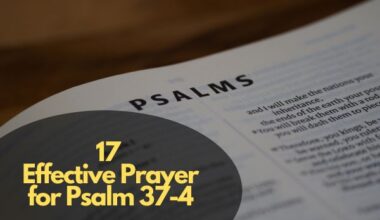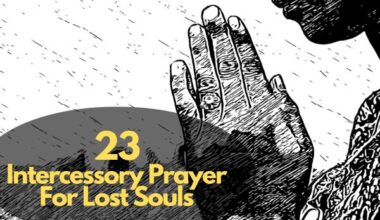Table of Contents Show
In the realm of relationships, where emotions often run high and uncertainty prevails the question of whether divine forces respond to our prayers is both deeply personal and universally significant. Prayers in relationships have been a topic of profound contemplation for centuries, captivating the minds and hearts of believers and skeptics alike. Let’s explore this intricate topic from various angles, considering the intertwining threads of faith, science, and human experience.
Does God Answer Prayers About Relationships
The foundation of understanding prayers in relationships lies in acknowledging the diverse beliefs and practices that have permeated societies throughout history. For many, prayer is a direct line of communication with the divine, a channel through which individuals seek guidance, solace, and intervention in their relationships. It is rooted in the fundamental human desire for connection, both earthly and spiritual.
Historical and Cultural Perspectives on Prayers
Across different cultures and eras, prayers have been integral to relationship dynamics. Ancient civilizations practiced rituals and supplications to deities associated with love, fertility, and harmony within partnerships. These traditions underscore the universal acknowledgment of the significance of relationships in the human experience.
Religious Beliefs and the Notion of Divine Intervention
Within religious frameworks, the concept of divine intervention in relationships varies widely. Some believe in predetermined paths, where every relationship is guided by a higher plan. Others emphasize free will, asserting that prayers serve as a means to align personal choices with divine wisdom. This diversity highlights the complexity of interpreting the role of prayers in relationships.
The Role of Faith and Devotion
Faith, a cornerstone of prayer, shapes the believer’s perspective on whether God answers prayers about relationships. Those with unwavering faith often find solace in the conviction that their supplications are heard and answered, even if the outcomes unfold differently from their expectations.
Different Religious Perspectives
Different religions offer unique teachings on prayers in relationships. Christianity emphasizes the power of prayer, encouraging believers to cast their worries upon God. Islam places great importance on prayer as a form of communication with Allah, seeking guidance in matters of the heart. Hinduism incorporates prayers and rituals dedicated to deities associated with love and relationships.
Scientific and Psychological Insights
Beyond the realm of spirituality, scientific inquiry has looked into the psychological aspects of prayers. Studies suggest that the act of prayer can have positive effects on mental well-being, offering a sense of comfort and reducing anxiety. The placebo effect, where belief in the effectiveness of a treatment influences its outcomes, mirrors the power of faith in prayers.
Placebo Effect and Belief Systems
The placebo effect demonstrates the influence of belief systems on the human body and mind. Similarly, faith in prayers can instill hope, foster resilience, and provide emotional sustenance in the face of relationship challenges. The intertwining of faith and psychological well-being underscores the intricate nature of prayers in relationships.
Psychological Benefits of Prayer
Prayer serves as a coping mechanism for many individuals navigating relationship difficulties. Engaging in prayer can promote relaxation, decrease stress levels, and enhance emotional regulation. These psychological benefits, coupled with the spiritual significance of prayers, contribute to their enduring presence in relationship dynamics.
Case Studies and Personal Experiences
Real-life stories offer glimpses into the profound impact of prayers on relationships. From reconciled partnerships to newfound love, individuals often attribute positive outcomes to the divine intervention they believe their prayers elicited. These anecdotes highlight the deeply personal and subjective nature of the relationship between prayers and relationship outcomes.
Real-life Stories of Prayer in Relationships
Countless individuals have shared testimonies of prayers seemingly answered in relationships. These narratives vary widely, encompassing stories of rekindled romance, strengthened bonds, and even unexpected encounters leading to fulfilling partnerships. Such accounts reinforce the conviction of believers in the efficacy of prayers.
Impact on Individuals and Relationships
Beyond external outcomes, prayers can also catalyze internal transformations. Individuals praying for relationships often report enhanced patience, empathy, and understanding. These changes, stemming from the spiritual practice of prayer, contribute to healthier relationship dynamics.
Critiques and Skepticism
While prayers hold profound significance for many, skepticism and criticism surround the idea of divine intervention in relationships. Atheistic perspectives challenge the existence of a higher power, questioning the validity of prayers. Ethical dilemmas related to free will and intervention raise thought-provoking questions about the nature of prayers.
Criticism from Atheistic Perspectives
Atheists often view prayers as mere wishful thinking, attributing positive outcomes to natural processes and human agency. From this standpoint, the idea of a divine being responding to prayers appears implausible, rooted in the realm of faith rather than empirical evidence.
Ethical Dilemmas and Free Will
The concept of divine intervention raises ethical dilemmas regarding free will. If a higher power intervenes in relationships, does it infringe upon individuals’ freedom to make choices? Skeptics argue that attributing relationship outcomes solely to prayers diminishes the complexity of human interactions and personal decisions.
Interpreting Coincidences and Natural Events
Discerning between coincidences and answered prayers presents a challenge for believers and skeptics alike. In the tapestry of life, events unfold in intricate and unpredictable ways, often leading individuals to find meaning in seemingly random occurrences. Distinguishing between divine intervention and natural events requires careful consideration.
Distinguishing Between Coincidence and Answered Prayers
Individuals experiencing positive relationship outcomes after prayer may interpret these events as answers to their supplications. However, discerning whether these outcomes are a result of divine intervention or mere coincidence involves introspection and contemplation. The line between faith and coincidence is often blurred, prompting individuals to find meaning in both.
Finding Meaning in Everyday Experiences
Even in the absence of overtly miraculous events, individuals find solace and meaning in everyday experiences. From serendipitous encounters to unexpected gestures of kindness, these moments offer a sense of connection and hope. For some, finding meaning in the ordinary becomes a form of answered prayer, emphasizing the subjective nature of divine communication.
Understanding Divine Timing
Patience, a virtue extolled in various religious teachings, plays a pivotal role in prayers about relationships. Believers often grapple with the concept of divine timing, trusting that their supplications are heard, even if the answers unfold gradually. Acceptance of different outcomes becomes an essential aspect of navigating the complexities of relationships through prayers.
Patience and Waiting for Answers
Prayers, especially in matters of the heart, require patience and trust. Waiting for answers tests the believer’s faith and resilience, prompting introspection and self-discovery. The period of waiting becomes an opportunity for personal growth and self-reflection, shaping individuals in profound ways.
Accepting Different Outcomes
Acceptance forms the crux of prayers in relationships. While individuals may fervently pray for specific outcomes, the acceptance of different results fosters emotional resilience. It allows individuals to adapt, learn, and find meaning even in situations where their prayers do not manifest as expected. This acceptance is a testament to the complexity of divine plans and human aspirations.
Coping Mechanisms and Emotional Support
Prayer often serves as a coping mechanism, providing emotional support during relationship challenges. The act of prayer, whether in solitude or communal settings, offers individuals a sense of connection with something greater than themselves. However, it is essential to acknowledge alternative methods of coping and seek support when needed.
Prayer as a Source of Comfort
In moments of distress, prayer provides a sanctuary for individuals, offering solace and a sense of belonging. The act of expressing emotions, hopes, and fears to a higher power can alleviate emotional burdens and create a space for healing. For many, prayer becomes a cornerstone of their emotional support system.
Alternative Methods of Coping
While prayer holds significance for believers, it is crucial to recognize that individuals cope with relationship challenges in diverse ways. Seeking professional counseling, confiding in friends and family, and engaging in self-care practices are equally valid avenues for emotional support. The combination of various coping mechanisms strengthens individuals and relationships alike.
Balancing Faith and Reality
Maintaining faith in the face of relationship challenges requires a delicate balance between spiritual beliefs and grounded realism. While prayers offer hope and comfort, individuals must also confront the complexities of human interactions. Open communication, self-awareness, and a realistic outlook contribute to navigating the intricacies of relationships.
Maintaining Faith in Challenging Situations
Challenges and uncertainties often test one’s faith. It is during these moments that the depth of belief in prayers is truly examined. Maintaining faith in the face of adversity involves acknowledging doubts and embracing vulnerability. In this process, individuals discover the resilience of their beliefs, reinforcing their conviction in the power of prayers.
Being Realistic in Expectations
Realism forms the foundation of balanced relationships. While prayers can provide guidance and emotional support, expecting miraculous solutions to every problem may lead to disappointment. Being realistic in expectations involves acknowledging that relationships require effort, compromise, and understanding from all parties involved. Faith can inspire positive actions, but it is essential to complement it with practical efforts.
Counseling and Communication in Relationships
The significance of open communication and seeking professional help in relationships cannot be overstated. While prayers offer spiritual guidance, effective communication lays the groundwork for understanding, empathy, and resolution. Professional counseling provides specialized support, bridging the gap between spiritual beliefs and practical relationship challenges.
Importance of Open Communication
Transparent communication forms the cornerstone of healthy relationships. Expressing emotions, concerns, and expectations openly fosters mutual understanding and trust. It allows individuals to navigate challenges collaboratively, fostering a sense of unity and partnership. Open communication complements the spiritual aspects of relationships, creating a harmonious balance.
Seeking Professional Help When Needed
In cases where relationship challenges persist, seeking professional counseling becomes imperative. Trained therapists offer expert guidance, facilitating constructive conversations and providing tailored strategies for relationship improvement. The integration of spiritual beliefs with professional counseling can create a comprehensive support system, addressing both the emotional and practical aspects of relationships.
Conclusion
In the intricate tapestry of human relationships, prayers weave a thread of hope, faith, and connection with the divine. The question of whether God answers prayers about relationships transcends religious boundaries, inviting contemplation and introspection. While the impact of prayers on relationships remains deeply personal, it is essential to recognize the multifaceted nature of this phenomenon.
Navigating the complexities of relationships requires a delicate balance between faith and practical efforts. Prayers can offer solace, emotional support, and guidance, instilling believers with resilience and hope. However, they are not a substitute for open communication, empathy, and mutual understanding. Embracing the complexities of human interactions, coupled with the strength derived from faith, empowers individuals to face relationship challenges with courage and grace.
FAQs About Prayers in Relationships
1. Can prayers change the outcome of a relationship?
Prayers can influence individuals’ perspectives, providing comfort and emotional support. However, relationships are shaped by various factors, including communication, mutual understanding, and effort from all parties involved.
2. How can one maintain faith in prayers during challenging relationship situations?
Maintaining faith during challenges involves acknowledging doubts and embracing vulnerability. It also requires seeking support from trusted individuals, engaging in self-reflection, and focusing on personal growth.
3. Is it necessary to follow a specific religious practice for prayers to be effective in relationships?
The effectiveness of prayers is subjective and personal. While religious practices can provide structure, the sincerity of one’s beliefs and the depth of their connection with the divine often play a significant role in the perceived effectiveness of prayers.
4. Can prayers help in healing emotional wounds caused by past relationships?
Prayer can offer emotional solace and support during the healing process. However, addressing past wounds often requires a combination of self-reflection, professional therapy, and time. Seeking professional counseling can provide tailored support for emotional healing.








